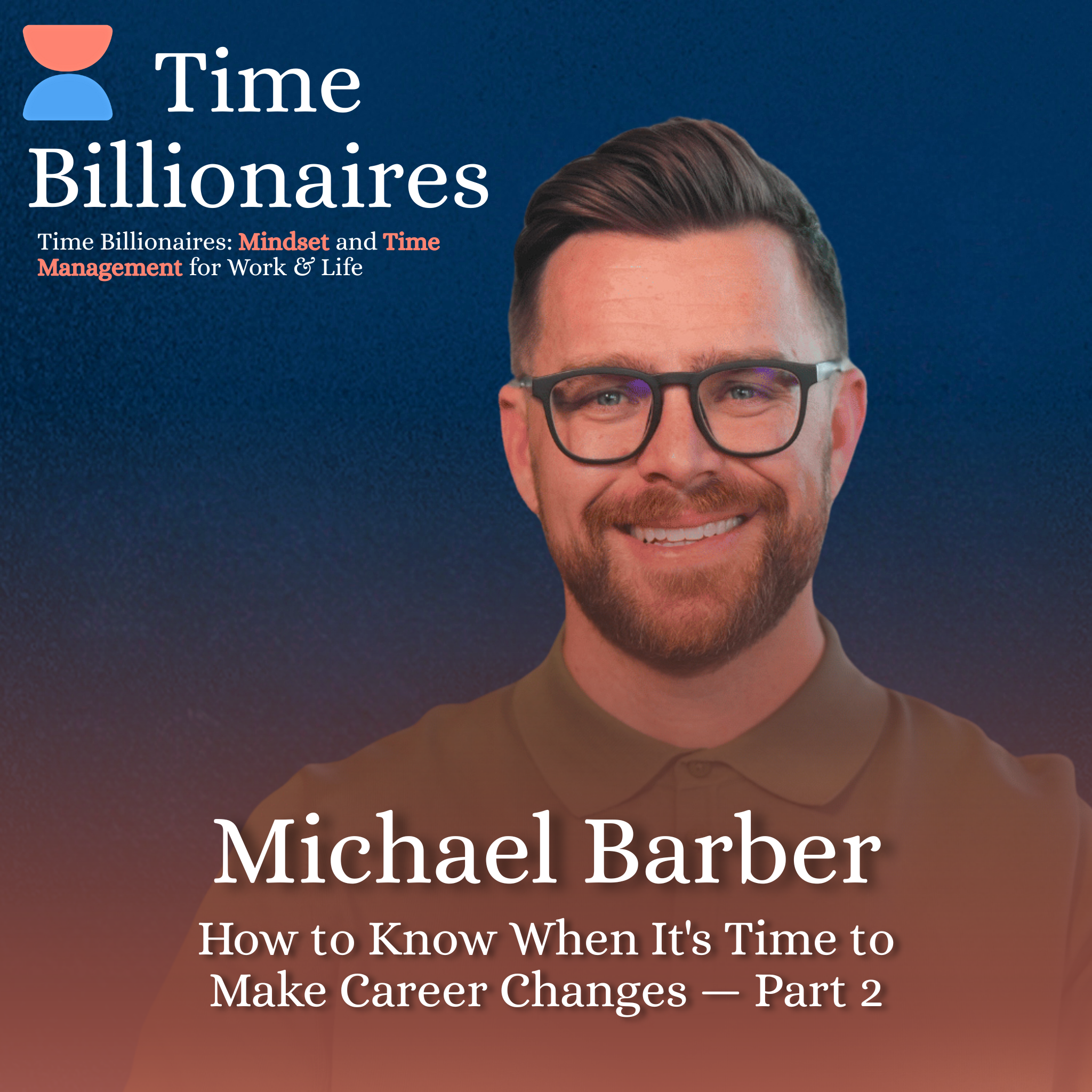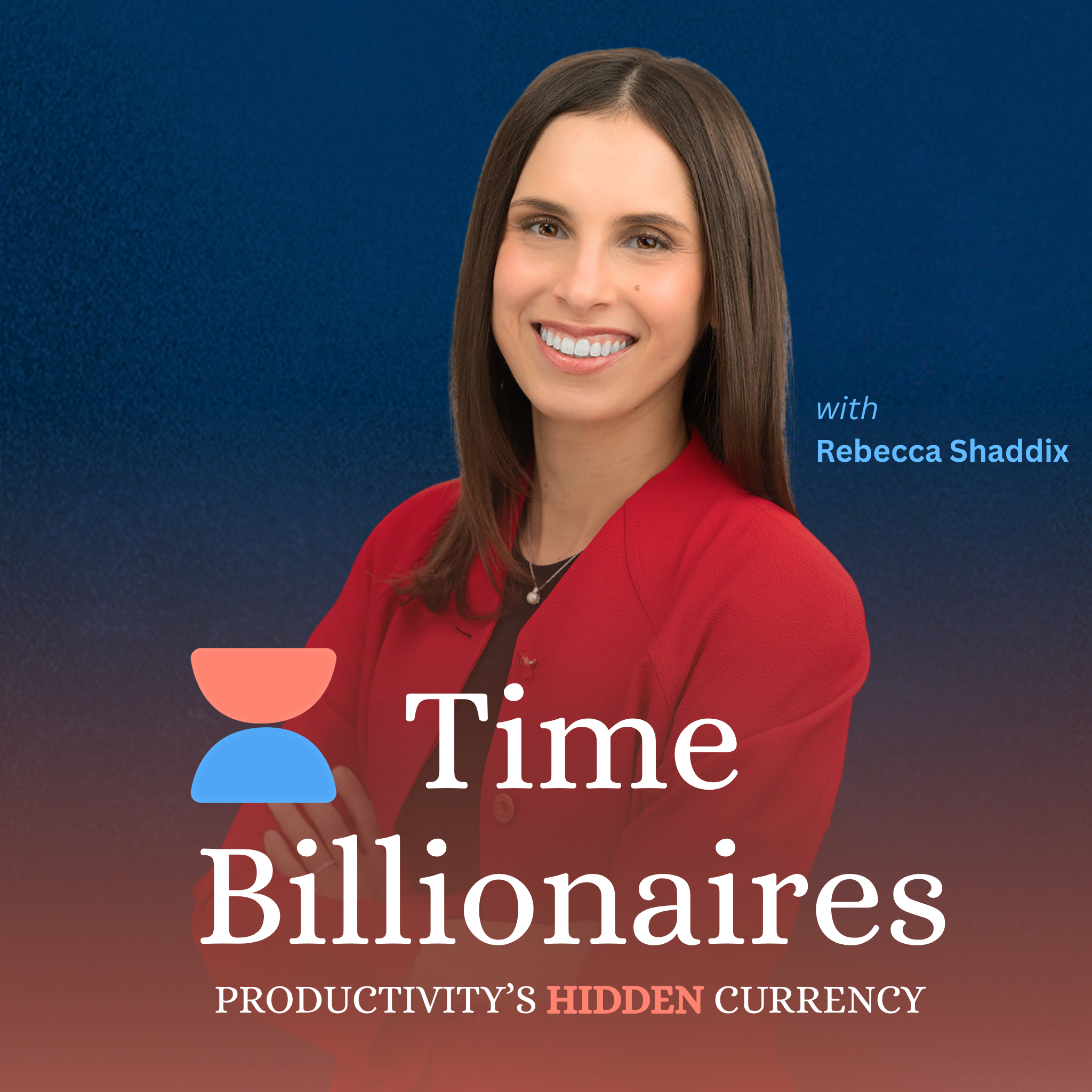Episode Transcript
[00:00:00] Speaker A: Steve Jobs was very well known for telling people to leave all the time. Like, is it important to do this right now? Everybody's happier if you have more focused time, more intentional time to do the things that will matter or will move the needle. And more often than not, I keep a timer on my desk. It does not take me long to do most of them if I'm really focused and sitting with it.
[00:00:36] Speaker B: This is a two part episode. If you want to check out the first part, listen to the previous episode of Time Billionaires. It's. It's funny because it's a habit and it feels pretty good to feel in control if you're busy, you're productive, you're meaningful. And so you've said that you've had this presence that comes from knowing the rest of your day is pretty well planned. Is that from the to dos that you track each morning, how do you know that the rest of your day is well planned?
[00:00:58] Speaker A: Yeah, it's a mix. I'll plan out usually five things that I'm really shooting to accomplish in my day. It's usually things that will have some sort of massive impact on my business or the goal of the week.
The goal of the week is not something I will do religiously, but it is a piece that helps me at least guide myself as a business owner in terms of what we need to accomplish to make more impact.
Then I plan each day and I'll take like five items that I really want to hit for that day. Some are bigger, some are smaller, and sometimes it's easy to do, sometimes it's a lot of work. But then beyond that, it allows me to schedule my day out and I can kind of fill ostensibly my 9 to 5 with time allotted to each of these activities. And more often than not, I keep a timer on my desk. It does not take me long to do most of them if I'm really focused and sitting with it and not getting all my distractions. And like life gets you. We get text messages all the time, notifications, emails, everything hits you.
And I'm on LinkedIn like you said. So there's a lot of people that want to have a conversation, but if I can block all of that out and really focus for very short periods of time. So the.
I can't remember the name of it, but the Pomeranian.
[00:02:20] Speaker B: Yeah, yeah, pomodoro method. It's great. 25 minutes on, 5 minutes off or 50 minutes on, 10 minutes off. Yep.
[00:02:26] Speaker A: Yeah, I do it at 20 minute increments and then it allows me to kind of basically achieve almost all of my tasks. If it comes down to more complex things, obviously it's going to take multiple iterations to get there, but I use that. I schedule my day in that thought process and it usually works well. When I'm in a bigger company, my day shifts. Right. If I have to go work for somebody like my time at the farmer's dog, thank God I have an ea.
But in those days it's a lot of meetings and you have to be just as diligent about planning that free time to think just as much. But if I do that and my day is scheduled, then I'm allowed to.
Not allowed, but it makes it a lot easier to be present. Right. And I don't have to think.
[00:03:14] Speaker B: No, I don't mean that. Intentional time batching. I find that one of the stressors I have whether I work for myself or for a company is a feeling that no matter what you're doing, there's something else that also needs to be done. And knowing there is that time. Emails will get answered in this intentional two hour time block at these time blocks, not in the seven minutes between meetings because you don't have time to answer them anyway. So just the intentionality and the mental piece of all I have to worry about in this meeting is this meeting makes that meeting more productive. Everything that comes out of it more effective sets the tone and the expectation for the rest of the team to be that present too. So it just is this compounding benefit that is exactly what I agree with. If the intentional time batching, the time blocks that you know this is all you have to focus on right now, means that you don't spend less time answering messages in meetings, but the ones that you do are such higher quality that it makes everything else more effective.
[00:04:07] Speaker A: Yeah. And that's very challenging in a bigger business too, when you get to that point of intentionality in meetings. Because there is certainly a culture of meetings at certain businesses where it can kind of creep in.
And I think Steve Jobs was very like probably a bit abrasive, but very well known for telling people to leave all the time. Like, do you even need to be here? Does this matter?
Is it important to do this right now?
And more often than not it's not. And could it be solved with just a message? Can you be quicker and thoughtful? Right. Be thoughtful about why we're doing this. Don't do it just for the sake of doing it.
[00:04:51] Speaker B: A hundred percent. And a higher barrier for recurring meetings too. If there is a recurring meeting, why, who Needs to be in there. And how are we actually tracking that it's effective? I think those tripwires early on, what will it take to can this meeting is really effective? Because then it's not personal. Right? We all agreed that if we're not achieving these goals, something changes. Same thing with product launches. Right? We all agree that we didn't hit this goal. This is what changes. And so then it's not punitive. It's a very high accountability culture and it's not anyone's individual blame.
[00:05:21] Speaker A: Yeah, I totally agree.
It goes so far and it goes so far for everybody's mental well being too. Everybody's happier. If you have more focused time, more intentional time to do the things that will matter or will move the needle or the bar.
[00:05:37] Speaker B: They will.
Can I shift us for a second to a question that's on my mind? And I know a lot of parents minds. You are great at social media. You have an amazing presence, fantastic content. You also have three kids. When you think about kids, social media time, intentional use of it, any of those topics, I want you to run with as you will, how you're teaching your kids to be wise or intentional with social media.
[00:06:03] Speaker A: Oh, boy.
I will say my oldest did not get a lot of training most of the time.
[00:06:09] Speaker B: How old is your parent?
[00:06:10] Speaker A: My oldest is 21. So my break is I'm a very experienced parent.
I have 21, five and two. And the 21 year old definitely had to learn like how to do it on his own. And so then I learned as a parent where to guide a bit better and help through those things. Um, and he, through him I've learned how I want to approach my youngest children who didn't necessarily grow up with social media. Right. Or are growing up in that world of social media, albeit we just don't expose them to it at this point yet.
The way I think that my wife and I are approaching it, and it's a team effort for sure, is to avoid a lot of that exposure for as long as we can. But be cognizant that at a certain point their friends are going to be on social media. Right. There is a break point for children where and this every parent is welcome to their approach. They want to jump into social media. They want to be, you know, they want to allow their kids to be on. I guess TikTok is the big one now, right. And I'm aged because I'm not a TikTok guy. But as they get on, you know, how do we teach them how to responsibly be present online without sharing everything. Like you're not obligated to share all about yourself in every way.
You're be careful too, because it's a.
There's a lot of negative out there. And cyber bullying is a. Is very much a real thing. I've seen it happen to other kids. And so there's this sense of how do you teach them what's enough and what's comfortable without letting them fully expose everything about themselves online or. And similarly, do they even need to be there? Right. Is it, is it necessary?
Probably not as much. Obviously we use it and it's like a hypocritical, hypocritical statement in a sense. But do they need to use it and should they?
I. I mean, I don't know if they need to as much unless there's some kind of benefit for them in the long term would be the way I kind of view it.
[00:08:35] Speaker B: Yet the intentionality is what I'm hearing there. And this is something I think of when we grew up, the same shows were on tv. We didn't really have to opt in to following certain people to understand the cultural references that our peers were making.
It was on. That was it. And so when we think about the intentionality of shared culture, language references, music, et cetera, that's what I think of as the benefits with constrained goals. People, you know, people you feel good following, people whose values mirror yours.
The exposure to all of these people, they'll never know, who curate lives that will never look like theirs, of course, is a recipe for unhappiness in comparison. That's different than saying, oh, I'm interested in this topic and we'll learn gardening tips from these people. Follow my friends, et cetera.
[00:09:23] Speaker A: Absolutely, yeah. And I heard another B.C.
sort of frame it, and I think we're going to see more of it. Is this concept of Web 4.0, where it's a curated culture online as opposed to being a.
A creator, like I am today on. On LinkedIn. Right. Where I can theoretically say something and influence a bunch of people to do something. Right.
And there's this thought that there's going to be like a curated culture that's going to emerge online.
And it's interesting to think of it in that light too, because then you're from a social dynamic and psychology perspective. And I'm not a behavioral scientist, but I enjoyed the topic.
But how does that influence our children?
And the intentionality of joining a group of people, much like joining a subreddit is for us today is very important because it can start to define you or redefine you as a person and what you think of and your choices and thoughts and processes. And there is no barrier right now to any of that. And that's the challenge with our children.
[00:10:42] Speaker B: It is.
Love it. Thanks for sharing that, Ryan. This was great. Anything you want to share before we wrap up?
[00:10:49] Speaker A: I really appreciate you having me on here, Rebecca. It was awesome. I love this kind of conversation, so it gets me all fired up for the day. So thank you.
[00:10:57] Speaker B: Same here. Thanks for sharing. Thanks for being here.


